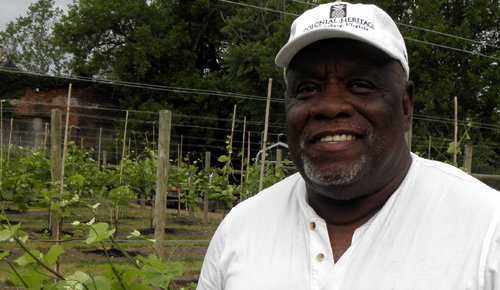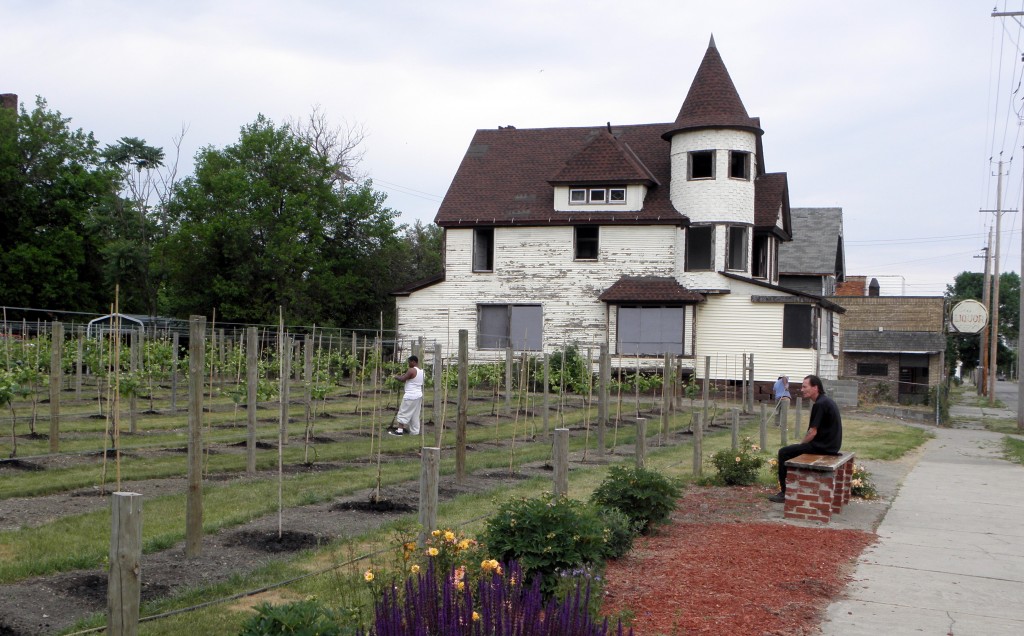
A garden hose snakes across the intersection at Hough Avenue and East Sixty-Sixth Street, in a poor urban neighborhood about a mile east of downtown Cleveland. One end is clamped to a city fire hydrant. On the other end, a gaunt man with a weathered face delivers a steady spray of water to the roots of a grapevine.
Around him, another half-dozen workers, dressed in T-shirts and jeans, are hoeing, clipping, and tying up the tender young grapevines of nearly three hundred plants, stretching wires between sturdy wooden posts to trestle the vines. Most of these workers are members of a nearby halfway house, performing court-imposed community service.
Once a deserted lot, the field where they work now boasts three quarters of an acre of prime Cleveland farmland. On one side is a derelict commercial building, partially obscured by weedy trees. On the other side, paint peels from the wooden siding of a boarded-up, white Victorian house.
Welcome to the Vineyards of Chateau Hough.
In the 1960s, the predominantly black neighborhood of Hough was the scene of Cleveland’s race riots, which left four dead and the city burning. For decades, the neighborhood was in decline. The area still has high crime figures and an average income well below the poverty line. Three years ago the corner lot was an overgrown eyesore, made vacant by the demolition of an apartment building abandoned in bankruptcy.
Then local entrepreneur Mansfield Frazier took over the land. At sixty-nine, Frazier is a stout man, whose salt-and-pepper beard skims the broad planes of his smiling face. He is self-educated, a Cleveland native, and a former convict (he prefers the term “formerly incarcerated”). And he is the visionary behind Chateau Hough, a vineyard in the inner city.
His personal story has traced much the same trajectory as downtown Cleveland’s over the past few decades: working-class life disrupted by a descent into lawlessness and poverty, followed by a slow recovery and reorientation toward new, less conventional livelihoods. Frazier grew up about a mile from Hough. He got married at seventeen (much too young, he admits). After high school he got a job with the local electric company. He aced the entrance exam, only to be put to work cleaning toilets. “I worked my way up to be the top welder on the steam line,” says Frazier, “but they would never promote me. They wanted me to train other guys less qualified, to promote past me. And it got very aggravating after a while. I was about to go postal.”
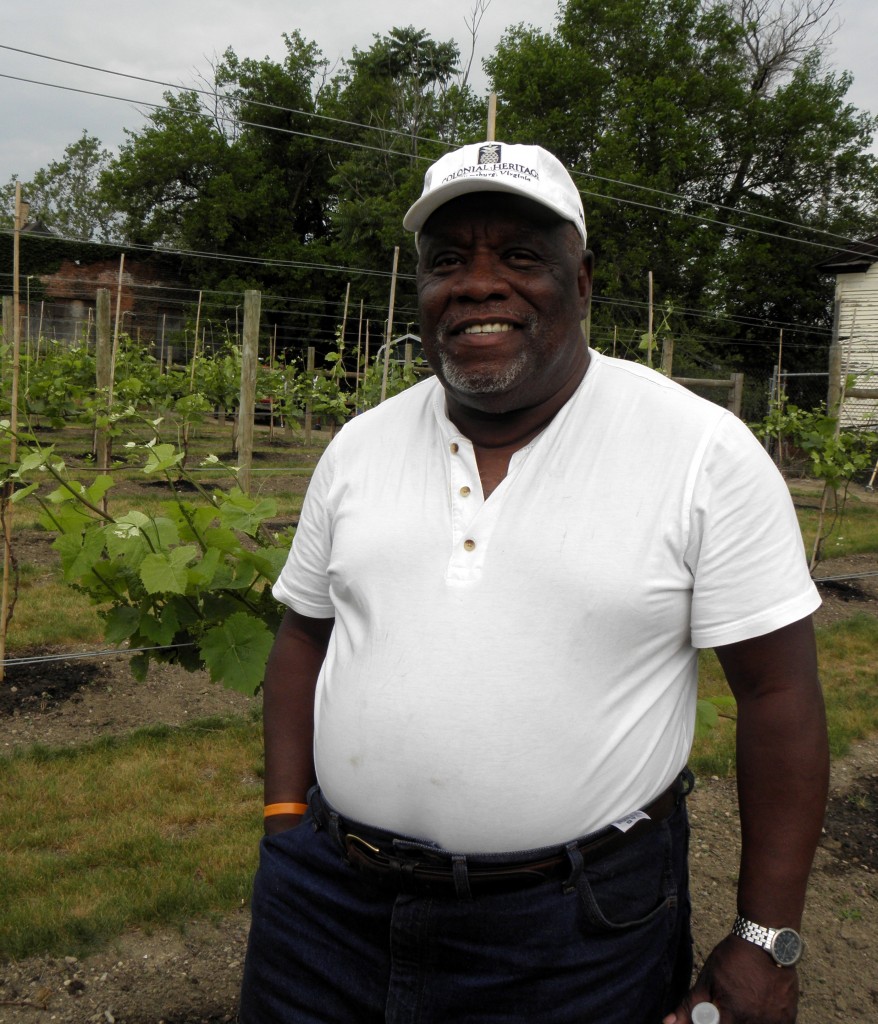
After the 1966 race riots tore apart the area, Frazier left Cleveland and began a twenty-nine-year career in counterfeiting. “I manufactured what are called counterfeit access devices, which are credit cards. And I did that all over the country,” says Frazier. “I didn’t mean to be a criminal, I meant to be an outlaw. There’s a difference, you know. Outlaws live outside the law. I didn’t have much respect for American law, because it wasn’t treating people fairly.”
The authorities failed to see the distinction. Frazier says he was never caught, but he was turned in more than once by fellow criminals and served several sentences in various prisons. But in 1992, his life changed while he was working in a prison library. “I was a tutor in math and English and I was reading an article by William Raspberry,” says Frazier, referring to the Pulitzer Prize-winning Washington Post columnist (Raspberry, who wrote about social issues such as race and poverty, died in July). “And I thought he was alright, but he was speaking from wealth — he’d never lived in the projects. So the other clerk said, ‘You think you can write something better?’ And I said, ‘Well, yeah!’ So on a dare, I started writing.”
While in jail, Frazier wrote and published From Behind the Wall (Paragon House, 1998), a commentary on crime, race, and the underclass. The book came out just a few days before his release. Frazier says that’s when the prison psychologist asked him a question: once he got out, was he going to go back to counterfeiting “and make everything in that book a goddamn lie”?
“That stopped me in my tracks,” says Frazier. “I felt like I’d been hit by a two-by-four.”
Frazier decided to see if he could make a success at something other than crime. After his release, he spent some time helping to build houses. Then he launched into his career as a writer. He got a job working for Cleveland’s black newspaper, the Call & Post, and later moved to the City News. He started Reentry Advocate, a bimonthly magazine that now appears in state and federal prisons in twenty states across the nation. These days, his essays on politics and race appear frequently in the Daily Beast, and he also writes a column for a local online magazine, CoolCleveland.com.
Thomas Mulready, publisher of CoolCleveland.com, admires Frazier for his fearlessness. “He’s not afraid to tackle taboo subjects,” Mulready says. “He says things other people aren’t saying.” In a recent commentary on the site, Frazier proposed that Jerry Sandusky, the former Penn State assistant football coach who was convicted of child sexual abuse, should commit suicide.
“I’m a provocateur,” Frazier admits. “I take contrarian points of view. And my background gives me a unique perspective that a lot of people might not have.” Comments about Frazier’s essays show up in almost every issue, Mulready says. “People do disagree with him. But he’s unusual — he often comes back and corrects himself and evolves his position.”
But after years in jail, just writing about social ills wasn’t enough for Frazier. He wanted to do something more tangible to change his community — to help “recreate the black middle class,” in his words. When he got out of prison, Frazier settled down in Hough. He built his own house there and stocked it with vegetable beds, a grapevine, and nut trees. Then he began work on another of his ideas.
An Oasis in a Food Desert
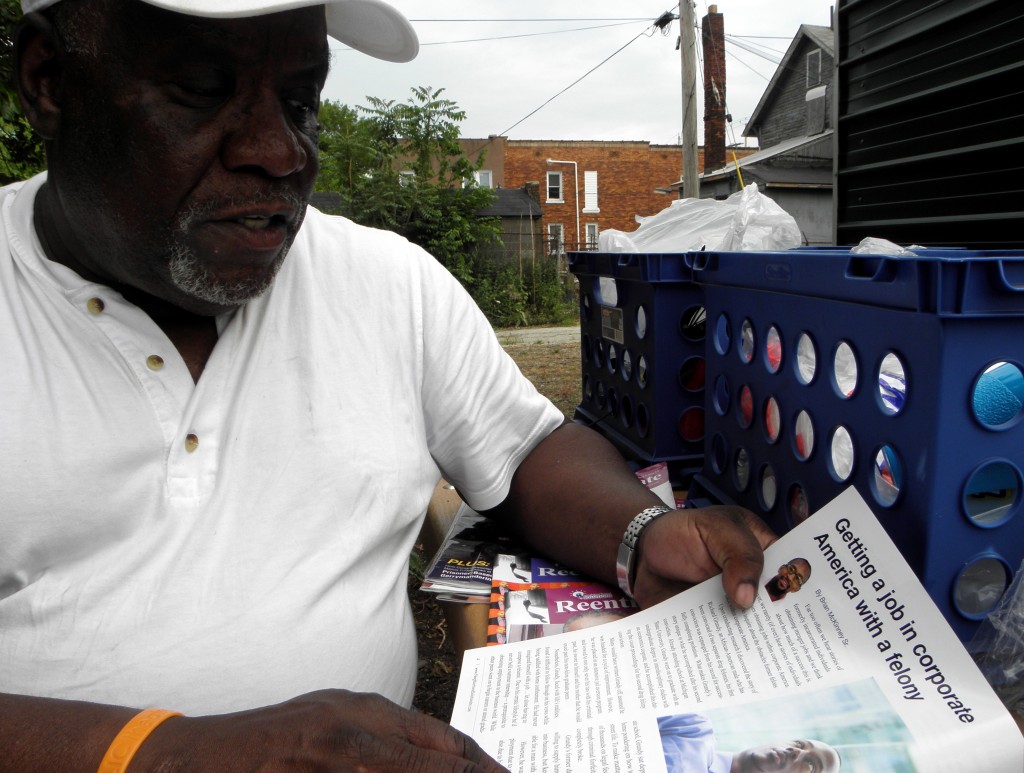
Across the Rust Belt in recent years, in the empty lots of cities like Cleveland and Pittsburgh, Youngstown and Detroit, urban gardens have been sprouting like spring mushrooms. Generally speaking, urban agriculture is nothing new. In her book Food and the City: Urban Agriculture and the New Food Revolution, journalist Jennifer Cockrall-King points out that urban gardens flourished during World War II: at one point, 40 percent of the nation’s vegetables were grown in these “victory gardens.” (In comparison, local foods expert Brad Masi estimates that today’s urban gardens in greater Cleveland produce about 1 to 2 percent of local food consumption; in cities like Chicago, it may be as high as 5 percent.)
What is perhaps different about today’s urban farms is the focus on reclaiming tracts of land in blighted downtown neighborhoods and planting viable businesses on them. And while the movement is still small, a number of trends in recent years have converged to support it. Against a backdrop of growing interest in climate change and pesticide-free produce, books such as The Omnivore’s Dilemma and documentaries such as Food Inc. have extolled the environmental virtues of locally grown, small-scale agriculture. Urban farming projects have gained national exposure with the success of pioneers like Will Allen, a former professional basketball player and MacArthur “genius grant” recipient who heads one of the country’s largest urban agriculture programs in Milwaukee. Meanwhile, the mortgage crisis that set in motion the Great Recession five years ago has brought about an abundance of available land, as abandoned homes and cratering real estate values have made it affordable to farm again on entire city blocks.
Mansfield Frazier was one local entrepreneur who saw an opening. In 2009, as his city was still reeling from the recession, he applied for an initial $18,000 grant from Reimagining Cleveland, a citywide program designed to support sustainability projects that rebuild neighborhoods. Frazier’s idea was to start a farm on an abandoned city lot. It was not just about making money, he says, but about providing food alternatives in a low-income neighborhood with plenty of fast food, but few healthy options — what experts call a “food desert.”
“What you see young mothers putting in their grocery carts is appalling,” says Frazier. “You’ve got to make healthy choices. You can’t raise kids off of Twinkies and that sugary fruit punch.”
A vineyard was the first stage of Frazier’s plans for his nonprofit farming venture. He admits he didn’t know much about wine when he started (“I’m an expert — at taking the cork out of the bottle”). But Frazier won over his skeptics on the grant committee with his personality and passion, and over the past three years he has studied the art of winemaking intensively through his collaborations with local experts, learning enough to start advising other would-be vintners in the city. “Can’t be that hard, it’s the world’s second-oldest profession,” Frazier jokes. “Grapevines have been around forever. The great thing is, you can screw them up and they still come back.”
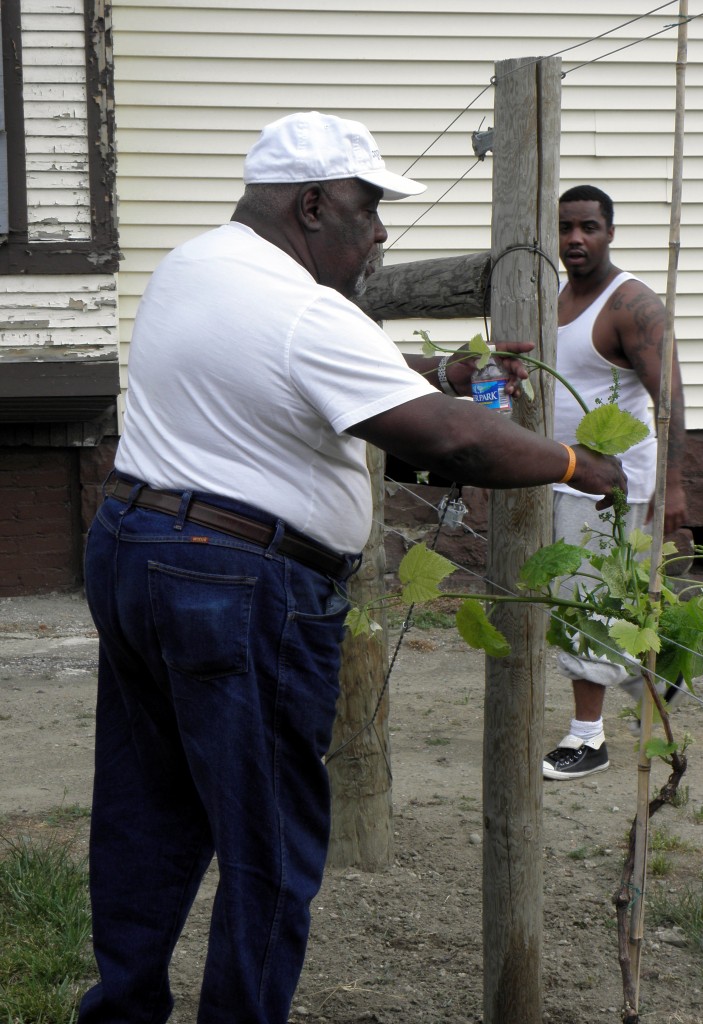
Neighborhood Progress, a Cleveland nonprofit that funnels federal dollars into local urban agriculture projects, boasts of Frazier’s vineyard as one of their biggest success stories. “His vision is huge — and it’s long-term,” says Lilah Zautner, the organization’s program manager. “He practices what he preaches, he walks the walk. For him to say ‘I want to put a winery and a vineyard in the middle of the inner city in the Hough neighborhood’ is an amazing vision. But also not just to have that vision, but to systematically make that happen.”
The grant from Reimagining Cleveland provided Frazier with the start-up capital for his farm, but local government has also helped him build that: as part of its land-bank program, the city of Cleveland is letting him use the lot virtually for free, so long as he pays the property taxes. Since his business is nonprofit, donations provide the rest of his funding, and local volunteers help out in the fields. And thanks to an agreement with a nearby halfway house, most of the vineyard workers are ex-offenders performing unpaid community service.
“It gives me a chance to mentor,” Frazier says. “We talk when we’re working. Guys say, ‘I’m going to get out, going to get me a dope bag.’ And I say, ‘That didn’t work too well last time. Maybe you want to think about doing something else.’”
Now that the winery is in business, Frazier is moving ahead with plans to expand his urban farm. “That building we intend to do fish-farming in,” he says, pointing at the decaying commercial building next to his lot. “The county wants to give me that building also. They don’t own it, but they’ll take it from the owner; it’s a blight. So we’ll do them a favor and save them from the taxes.” Likewise, Frazier is paying off someone else’s $1,600 tax bill in exchange for the sagging Victorian house on the other end of his vineyard, whose basement he plans to convert into a bio-cellar, a semi-subterranean greenhouse that will be covered with a twenty-foot-high roof of plexiglass. There he’ll grow shiitake mushrooms for local restaurants (they’re selling now for $20 a pound, he notes). Across the street on another vacant property, Frazier sees a vegetable garden whose produce will go to area food banks.
In Hough, the supply is certainly there to meet the demand. Over the last decade there has been some reinvestment in new condominiums and private housing, but much of the neighborhood is still in disrepair, with land bank-owned boarded-up houses and vacant lots. (Overall, Cleveland has 1,200 acres of land — almost 10,000 city lots — available for projects like Frazier’s.)
Just having an urban farm nearby can shape the ways that people in the neighborhood look at their food, Frazier says. “The goal is to train kids and let them see how crops grow, and you can change their eating habits. I think that’s critically important. We are a very unhealthy nation.” And the presence of a growing, locally owned business in Hough will make the community healthier in other ways, too. Frazier sees urban agriculture jobs as a good fit for former inmates reentering the workforce — and as a productive outlet for young people as well, “to keep them off the streets and out of prison.”
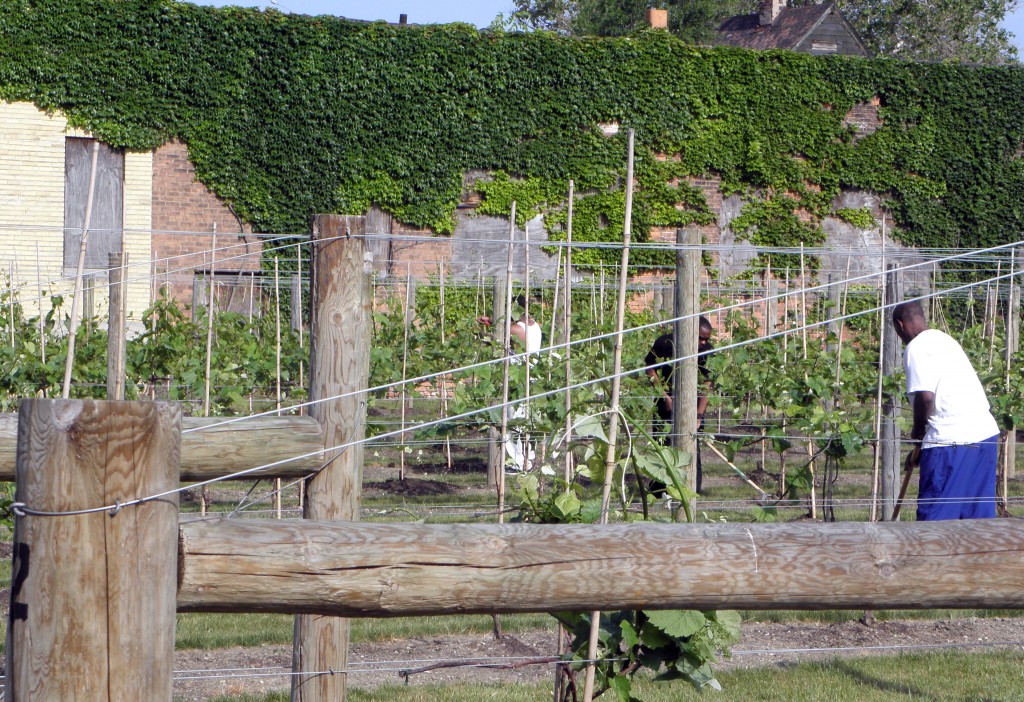
That’s what Frazier means when he talks — with his characteristically heady ambition — about “recreating the black middle class” in Hough. The neighborhood doesn’t need saviors; it needs investors to tap the potential that’s already there — in the soil, and in the people. “I don’t think the neighborhood is in that much need of redemption,” Frazier notes. “I don’t think the neighborhood is bad.”
This fall, Frazier harvested his first crop. He doesn’t have a winemaking license, so he’s invited amateur vintners in the area to come and use his Traminette and Frontenac grapes. Frazier personally prefers sweeter wines, like Riesling or Moscato. But he says he doesn’t care what kind of wine comes from the grapes. He just hopes that one day locals will be able to buy a bottle of Chateau Hough.
“Everybody wants to see what the ground has wrought,” says Frazier. “And it’s impossible to tell — you can’t predict what the wine’s gonna taste like. And I’m getting curious.
“Who knows? I might even make an award-winning wine.”
Karen Schaefer is a freelance writer in Ohio.
- Follow us on Twitter: @inthefray
- Comment on stories or like us on Facebook
- Subscribe to our free email newsletter
- Send us your writing, photography, or artwork
- Republish our Creative Commons-licensed content

